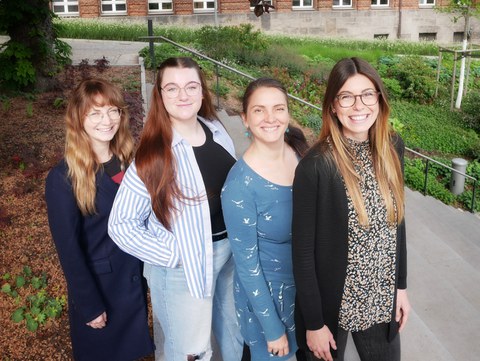Tutoring Hybrid
Das Projekt "TUTORING hybrid" hat sich zum Ziel gesetzt, hybride Lehr-Lern-Szenarien in Tutorien, Übungen und Praktika zu identifizieren, didaktisch zu analysieren sowie interdisziplinär weiterzuentwickeln und in Form von Open Educational Practices (OEP) bereitzustellen. Ein besonderer Schwerpunkt liegt auf der Kompetenzentwicklung der Lehrenden in interaktiven hybriden Tutorien, Tele-Tutorien ( DikoLint und DigitalHerrnhut), Übungen sowie Labor- und Maschinenpraktika (PraktikaHybrid). Das übergeordnete Ziel ist der Transfer dieser Konzepte auf die gesamte Universität.
Seit 2023 entwickeln und erproben wir agile, innovative und praxisorientierte Formate zur Qualifizierung von Tutor:innen. Dabei steht die methodische, didaktische und digitale Weiterbildung im Fokus. Unsere Angebote reichen vom „Seminarraum des Schreckens“ als Simulationstraining über den 360°-Raum und den digitalen Escape Room bis hin zum Flipped Classroom in der Basisqualifizierung. Besonders beliebt ist inzwischen auch die Masterclass, ein semesterbegleitendes Qualifizierungsformat, das zunehmend nachgefragt wird.
Gemeinsam fördern wir eine offene, partizipative Lehrkultur und gestalten Lehre zukunftsorientiert durch mehrsprachige Selbstlernkurse, verschiedene frei verfügbare Materialien als OER | OEP und das aktive Vorantreiben einer gelebten Kultur des Teilens und Weiterentwickelns in der Hochschullehre.
TUTORING-Infothek
Innerhalb der Innovationsteams werden Qualifizierungsbausteine entwickelt, getestet und zur Verfügung gestellt, um die Fachspezifik und die praxisnahe Anwendung sicherzustellen. Hierbei fließen innovative Lehr-Lern-Settings ein, die im Kontext von virTUos analysiert oder entwickelt wurden. Besondere Aufmerksamkeit gilt den Tutor:innen als Zielgruppe, da sie in ihrer Doppelrolle als Studierende und Lehrende wertvolle Einblicke bieten und als "lehrende Lernende" zusätzliche Kompetenzen aufbauen können. Zudem fungieren sie innerhalb von virTUos als Entwickelnde und Multiplikator:innen von OEP.
Im Zuge des Projekts "TUTORING" am Zentrum für interdisziplinäres Lernen und Lehren wurden bereits relevante Ergebnisse erzielt und Erfahrungen gesammelt, die als Ausgangspunkt für die Weiterentwicklung dienen. Dazu zählen die Entwicklung einer Kollektion von teils hybriden Tutorien und Praktika, die als "Lehrdesigns" bezeichnet werden, sowie die Durchführung einer hybriden Session im Rahmen der Tutor:innenqualifizierung im Maschinenwesen. Dies verdeutlicht unser Engagement für innovative Lehransätze und die kontinuierliche Weiterentwicklung des Lehrangebots.
- Beiträge von Johannes Reimer und Maximilian Hubmann https://www.slub-dresden.de/mitmachen/open-educational-resources/oer-display
- Beatrice Schlegel / Melanie Ludwig: Erkenntnisse aus der Tutorienarbeit unter pandemischen Bedingungen. Lessons Learned (2022): https://journals.qucosa.de/ll/article/view/43/73
- TUTORING-Veröffentlichungen: https://tu-dresden.de/tu-dresden/karriere/weiterbildung/zentrum-fuer-weiterbildung/tutoring/publikationen
- Henriette Greulich (Leitung des Zentrums für interdisziplinäres Lernen und Lehren, Projektleitung)
- Melanie Ludwig (Wissenschaftliche Mitarbeiterin am Zentrum für Weiterbildung, ZfW, Projektleitung)
- Michelle Pippig (Wissenschaftliche Mitarbeiterin)
- Pauline Thamm (Wissenschaftliche Mitarbeiterin)
- Anne Seipel (studentische Projektmitarbeiterin)


